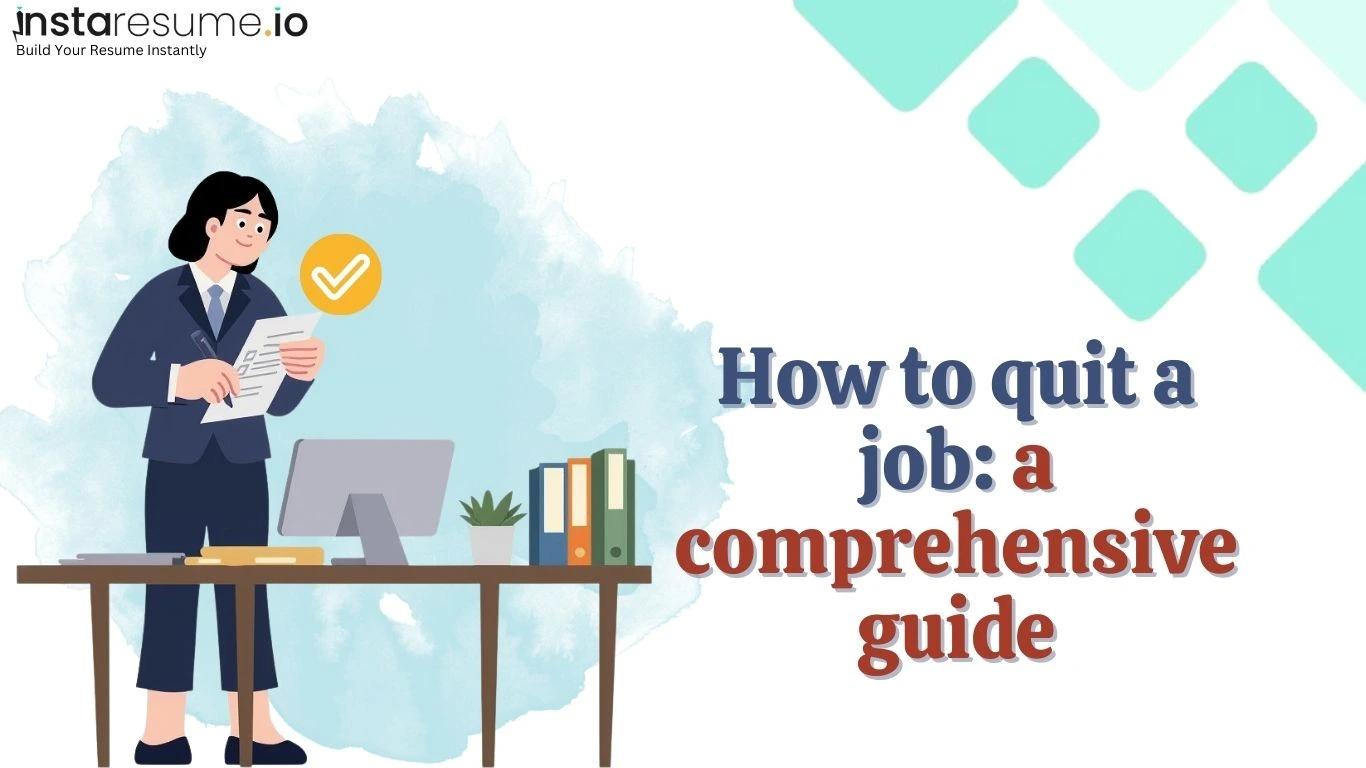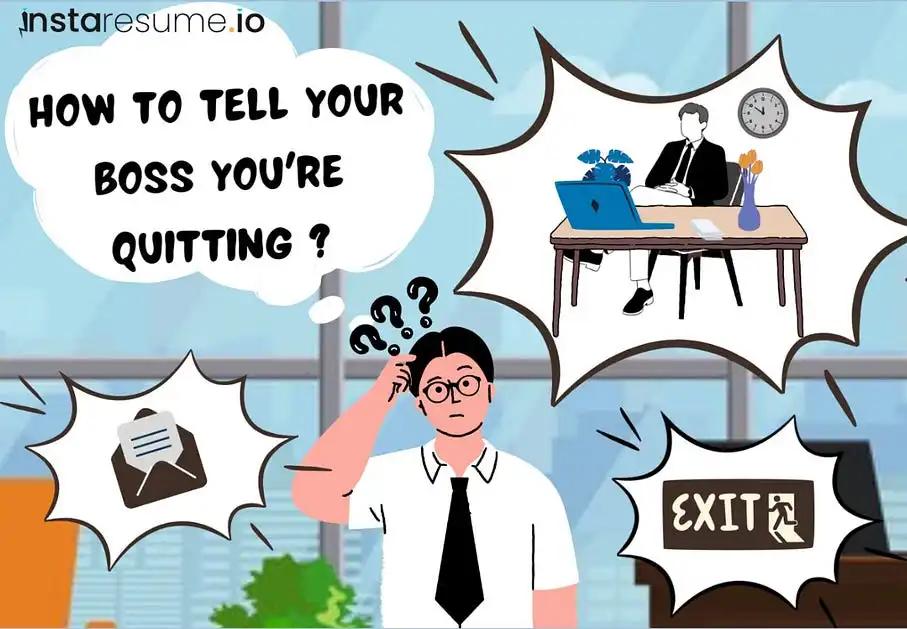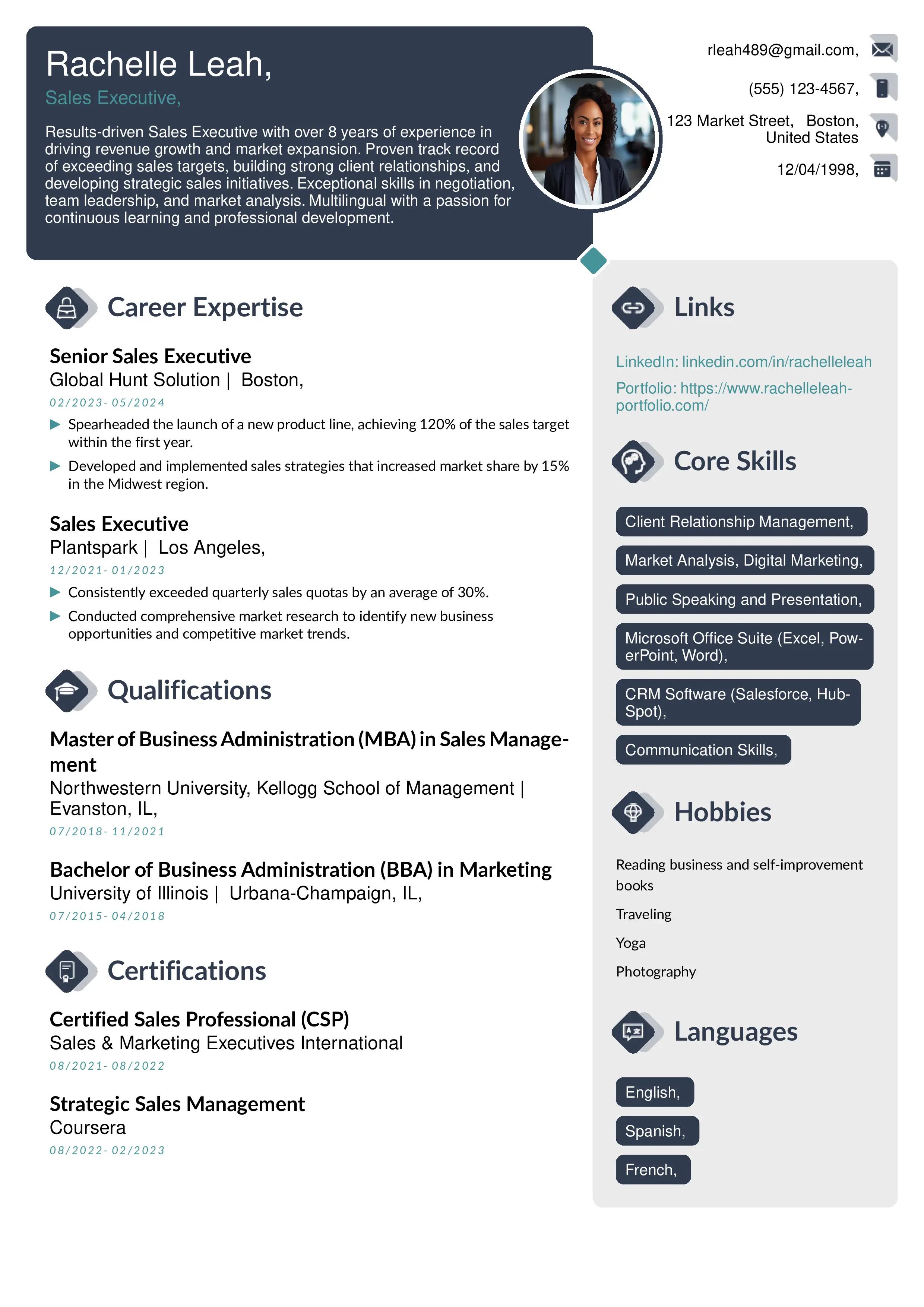How To Quit A Job: A Comprehensive Guide
Trust Score: 4.7
360 reviews

Table of Contents
In the journey of life, there comes a moment when we must bid adieu to our current professional chapter and embark on a new one. Yes, we’re talking about resigning from a job. But hold on, it’s not just about handing in a resignation letter and walking out the door. Oh no, it’s far more than that!
Picture this You’re on a stage, and your performance is your professional reputation. Quitting professionally is like nailing every move, leaving the audience (your future employers) impressed and eager to see more.
But why is it so crucial to quit a job professionally, you wonder? Well, let me tell you a secret: Your reputation precedes you. And the way you handle your exit speaks volumes about your character and work ethic. It’s like leaving a lasting impression at the end of a play — you want the audience (your colleagues, bosses, and industry peers) to remember you positively, not as the one who stormed off stage in a huff.
So, my dear reader, buckle up and get ready to learn the art of quitting like a pro. Because in this comprehensive guide, we’re not just talking about resigning; we’re talking about setting the stage for your future success.
Making Sure Quitting is the Best Choice
Before you make the big decision to quit your job, it’s important to take a step back and assess your reasons for leaving. Are they valid and substantial enough to warrant such a significant change?
Reflect on your motivations and determine if there are any alternative solutions or compromises that could address your concerns without resorting to resignation.
Once you’ve thoroughly evaluated your reasons for leaving, it’s time to consider your next steps. Do you have a clear plan or opportunity lined up, or are you simply leaving on a whim? Securing a new job offer or having a definite next step in mind can provide a sense of direction and confidence in your decision to quit.
Setting a timeline for your resignation can help ensure a smooth transition and minimize any disruptions to your current workplace. Consider factors such as project deadlines, team dynamics, and the availability of replacements when determining the most appropriate time to submit your resignation.
Quitting a job is a significant decision that should not be taken lightly. By carefully considering these factors and planning ahead, you can ensure that quitting is the best choice for your career and prospects.
The Importance of Telling Your Manager First When Quitting Your Job
When you’ve decided to leave your job, it’s crucial to inform the right person first your manager. Not your work buddies or colleagues from other departments. Keeping it, professional means starting and ending with your manager.
Imagine it like this, if your news spreads, even if others promise to keep it quiet, it can cause unnecessary drama. So, follow the office rules and speak to your manager before talking to anyone else. It’s like following the steps in a game; your manager is the first level you need to clear before moving on.
Pro Tip: Did someone find out you’re quitting? Don’t panic. Tell your boss fast before he finds out through the grapevine.
How to Tell Your Boss You’re Quitting
As we discussed that you need to inform your manager first. Now, let’s see how to tell your manager that you are leaving gracefully.
Firstly, maintain a respectful tone throughout the conversation. Avoid trash-talking or criticizing the company or department. Instead, focus on expressing gratitude for the opportunities and experiences you’ve had during your time there.
Next, be sure to thank your boss for their support and guidance. Highlight a few specific things that you’re grateful for, whether it’s mentorship, training opportunities, or simply the chance to work with a great team. This acknowledgment of their contributions helps to soften the blow of your resignation.
Now, it’s time to explain your reason for leaving. Be honest and transparent about your decision but avoid going into unnecessary detail. Whether it’s for personal reasons, career growth, or a better opportunity elsewhere, make sure your explanation is clear and concise. This shows professionalism and respect for your boss’s time.
Here’s an example of what to say when quitting a job to your manager.
Employee: Hi [Boss’s Name], do you have a moment to chat?
Boss: Of course, what’s on your mind?
Employee: Well, I’ve been doing a lot of thinking, and I wanted to let you know that I’ve made the difficult decision to resign from my position here.
Boss: Oh, I see. Can you tell me what led to this decision?
Employee: Yes, definitely. I want to start by expressing my gratitude for the opportunities and experiences I’ve had here. I’ve learned a lot and grown both personally and professionally during my time with the company.
Boss: That’s good to hear. We’ve valued having you on the team.
Employee: Thank you, I appreciate that. However, after careful consideration, I’ve concluded that it’s time for me to pursue new challenges and opportunities. I feel it’s the right step for my career growth at this time.
Boss: I understand. We’ll be sad to see you go, but I respect your decision. Is there anything specific that we could have done differently to change your mind?
Employee: No, it’s not about anything the company could have done differently. This decision is based on my personal career goals and aspirations.
Boss: Fair enough. Well, I want to thank you for your contributions to the team. Is there anything I can do to help with the transition process?
Employee: Thank you, I appreciate that. I’m committed to ensuring a smooth transition and will do everything I can to assist with handing over my responsibilities.
Boss: Great, I’m glad to hear that. Let’s work together to make this transition as seamless as possible.
Employee: Absolutely. Thank you again for your understanding and support.
Boss: You’re welcome. Best of luck in your future endeavors, [Employee’s Name]. We’ll miss having you around here.
Employee: Thank you, [Boss’s Name]. I’ll miss the team too.
How to Quit a Job You Just Started?
So, you find yourself in a situation where you’ve barely settled into your new job, but circumstances beyond your control demand that you consider leaving. It’s not an ideal scenario, but sometimes life throws unexpected curveballs. If you’re faced with the tough decision of quitting a job you just started, here’s how to handle it professionally.
Face-to-Face Meeting: Communication is key. Schedule a face-to-face meeting with your manager to discuss your decision. Be honest and transparent about the reasons behind your departure, emphasizing that they were beyond your control. This personal touch shows respect for your employer and helps maintain a positive relationship, despite the circumstances.
Willingness to do knowledge transfer diligently: Consider offering solutions or alternatives to mitigate the impact of your departure. Whether it’s helping to train a replacement or assisting with the transition process, demonstrating your willingness to support the team during this challenging time can leave a lasting impression and soften the blow of your resignation.
While quitting a job you just started is not ideal, sometimes it’s unavoidable. By approaching the situation with honesty, respect, and a willingness to assist, you can navigate this challenging process with grace and professionalism.
Remember, it’s not just about how you leave a job, but how you handle the exit that truly defines your character and reputation.
Here’s an example of what to say when quitting a job, you just started to your manager.
You: Hi [Manager’s Name], could we have a quick chat? I have something important to discuss.
Manager: Sure, let’s talk. What’s on your mind?
You: I appreciate the opportunity to work here, but after careful consideration, I’ve decided that this position isn’t the right fit for me. I want to give you as much notice as possible and ensure a smooth transition. I hope we can work out the best way to handle this.
Manager: I’m sorry to hear that. Could you share what led to this decision? Maybe we can address any concerns you have.
You: Thank you for the offer, but I’ve realized that my career goals and this role aren’t aligned. I believe it’s better to move on now rather than later. I hope you understand.
Manager: I understand. When would be your last day? We can work on transitioning your responsibilities to someone else.
You: I’d like to offer [X weeks’ notice], and I’ll do my best to help train someone to take over my tasks. Would that work for you?
Manager: That should work. We’ll start the process of finding a replacement. Thank you for being honest about your decision.
You: Thank you for understanding. I’ll do everything I can to make this transition as smooth as possible.
How to Quit a Job Without Notice?
Leaving a job without notice can have serious consequences for both you and your employer. However, in rare situations where it’s absolutely necessary, it’s crucial to handle the situation with care and precision.
Communicate Communicate Communicate: Firstly, understand that quitting without notice should be a last resort. It’s not something to be taken lightly, as it can leave your employer in a difficult position and damage your professional reputation. However, if you find yourself in a situation where leaving immediately is unavoidable, it’s essential to communicate your reasons to your boss clearly and concisely.
Explain Personal Circumstances: When explaining your decision to quit without notice, be sure to provide specific and valid reasons for your actions. Whether it’s due to personal circumstances, health issues, or a sudden change in circumstances, make sure your explanation is honest and precise. This helps your boss understand the gravity of the situation and may mitigate any negative consequences.
Additionally, be prepared for potential backlash or fallout from your decision. Quitting without notice can strain relationships and burn bridges, so handling the aftermath with professionalism and grace is important.
Take responsibility for your actions, apologize if necessary, and try to minimize any disruption or inconvenience caused by your sudden departure.
Don’t forget to update your resume after submitting your resignation letter
After submitting your resignation letter, it’s essential to take some time to refine your resume. Tailoring your resume ensures that it reflects your most recent accomplishments, skills, and relevant experience—this will increase your chances of standing out to prospective employers.
How to Quit a Job You Just Started Via Email?
If you need to resign from a job via email, it’s important to be concise, professional, and clear. Here’s an example email you could use to quit a job you just started:
Subject: Resignation – [Your Name]
Hi [Manager’s Name],
I hope you’re doing well. I wanted to let you know that I’ve decided to resign from my position at [Company’s Name], effective [Last Day – X days/weeks from now]. I appreciate the opportunity to work here, but after much thought, I’ve realized that this role isn’t the right fit for me.
I’m committed to ensuring a smooth transition and will do my best to complete any outstanding work and assist with the handover process. Please let me know how I can help make this process as seamless as possible.
Thank you for your understanding, and I wish the team continued success.
Best regards,
[Your Name]
This email covers the key points: your decision to resign, your intended last day, an offer to help with the transition, and a note of gratitude. Keep it polite and professional and be prepared for follow-up discussions about the transition process.
How to write a two week notice letter
When it’s time to leave your job, giving a two weeks’ notice is a standard practice that allows for a smooth transition. Here’s how to do it professionally and respectfully:
First, schedule a meeting with your boss to discuss your resignation. Be prepared to explain your reasons for leaving and express gratitude for the opportunities you’ve had.
During the meeting, present your resignation letter outlining your intention to leave and the effective date of your departure. Keep the tone positive and focus on the reasons for your decision.
Offer to assist with the transition process by training your replacement or documenting your responsibilities. This shows your commitment to ensuring a seamless handover and leaves a positive impression on your employer.
Finally, maintain professionalism throughout the notice period by fulfilling your duties and tying up loose ends. Leave on good terms by expressing appreciation for your time with the company and saying goodbye to colleagues.
By following these steps, you can resign from your job with dignity and professionalism, setting the stage for a successful transition to your next opportunity.
FAQs: How to Quit a Job Professionally
1️⃣ How do I quit a job professionally?
2️⃣ What is the best way to resign from a job?
3️⃣ How much notice should I give before quitting a job?
4️⃣ Should I resign via email or a printed resignation letter?
5️⃣ What should I write in a resignation letter?
A resignation letter should include:
 Clear intent to resign
Clear intent to resign Your last working day
Your last working day Gratitude for the opportunity
Gratitude for the opportunity Offer to assist during transition
Offer to assist during transition
Avoid complaints or emotional statements to keep your resignation professional.
6️⃣ Can I quit a job without serving the notice period?
7️⃣ Is it okay to quit a job without another offer?
8️⃣ How do I quit a toxic or stressful job professionally?
9️⃣ What mistakes should I avoid when quitting a job?
Avoid these common mistakes:
 Resigning impulsively
Resigning impulsively Badmouthing the employer
Badmouthing the employer Skipping formal resignation
Skipping formal resignation Ignoring notice period rules
Ignoring notice period rules
These errors can harm your professional image.








